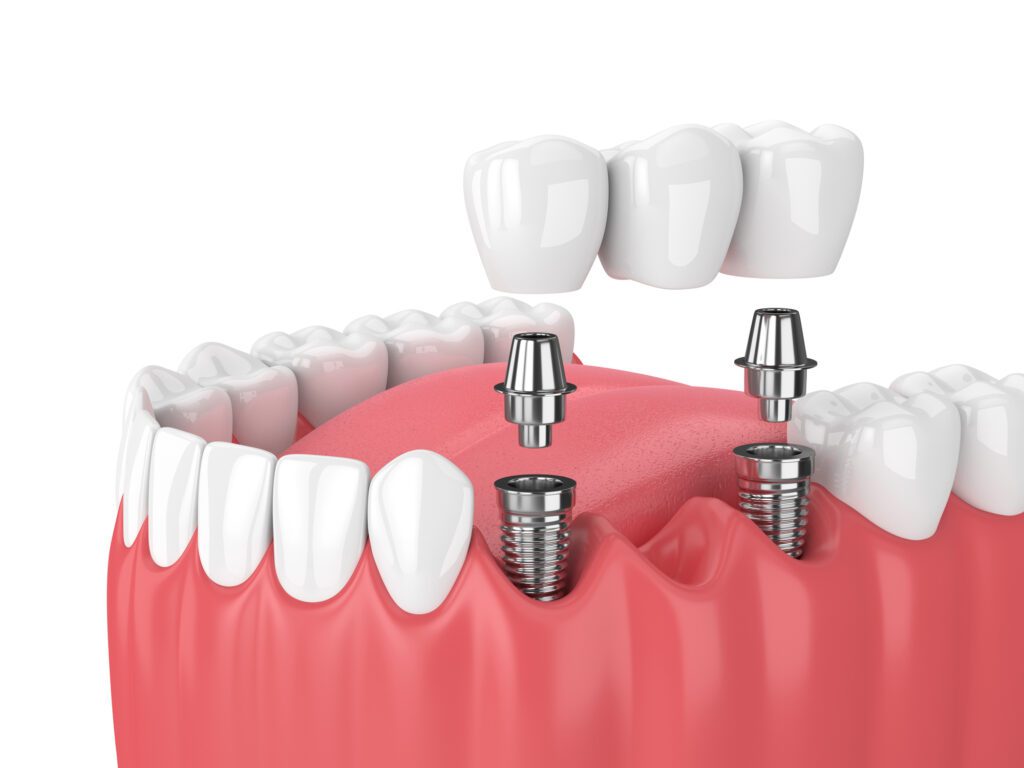Patients missing two or more consecutive teeth can benefit from replacing their teeth. Multiple gaps along the arch make it difficult to bite, chew food, and pronounce certain words correctly. Dr. Elizabeth Duling is an expert dentist who replaces missing teeth with several dental restorations. If you miss more than two consecutive teeth, she can provide you with an implant-supported bridge in Owens Cross Roads, AL.
Dr. Duling can also provide partial dentures and traditional dental bridges. However, the implant-supported bridge is the best solution for your oral health. Implant restorations offer the best look and bite stability.

What is an Implant-Supported Bridge?
An implant-supported bridge uses support from dental implants to replace multiple missing teeth in a row. Implant bridges can create a highly functional tooth replacement. Dental implants are small metal screws that act as new tooth roots. A dental implant includes a metal post, a connecting piece, and a restoration.
We surgically place at least two dental implants in the jaw during implant bridge treatment. There, the metal implant posts will fuse to the bone. This creates a sturdy base for the dental bridge.
Once the implants fuse to the bone, after about three to six months, we attach the abutments. These connector pieces combine the implants and the bridge.
The dental bridge consists of the false teeth (the pontics) fused to create a single prosthesis. Dental crowns are located on each end of the bridge. The crown portion of the prosthesis is what your dentist will secure to the abutments. Dr. Duling with cement or screw the crowns to the abutments.
Your dental bridge will be custom-made to blend in naturally with the rest of your remaining teeth. The dental implants will help make it stable and function more like natural teeth.
Is an Implant-Supported Bridge Right For Me?
Before even considering dental bridges, we will take dental X-rays. We will also examine your smile for problems like gum disease, tooth decay, weakened teeth, and damage.
A bridge may be right for you if you have one to four missing teeth in a row. Partials and dentures are not the same. A partial restores teeth in different parts of the mouth. Dental bridges only replace one row of lost teeth.
Before implant treatment, we must ensure that you have healthy teeth and gums. In some cases, we must remove severely infected teeth. Removing teeth may change the type of restoration you need. Additionally, we can recommend gum disease treatment to restore your gum health before implants.
Implants need enough jaw bone to provide a stable base for false teeth. We recommend bone grafting treatment if you do not have enough jaw bone for implants.
If you have a single missing tooth, we will recommend an implant-supported crown over a bridge. While a traditional bridge can replace a single tooth, it can damage other natural teeth. A single implant will renew the appearance and function of a missing tooth without affecting other teeth.
Why Choose an Implant-Supported Bridge?
Learning and comparing all your options is essential when considering replacing multiple missing teeth. Besides an implant-supported bridge, you can also choose a partial denture or a traditional dental bridge to replace your teeth.
Below, we will compare implant bridges, partials, and traditional bridges:
Implant-Supported Bridge vs. Partial Denture
A partial denture is a removable appliance. It offers less stability and comfort than an implant bridge. Partials do not help maintain your overall oral health.
A partial consists of false teeth on an acrylic base. This restoration clasps onto the remaining teeth. Partials can put extra pressure on those remaining teeth. This increases the risk of tooth and gum damage.
A bridge secured with dental implants does not use support from remaining teeth. This preserves their integrity. Since the partial is only held in place with teeth, it does not provide much stability when biting and chewing food. You will have to eliminate hard and crunchy foods from your diet.
A partial will also replace the missing teeth roots. This means the underlying jaw bone will lack the necessary stimulation to prevent bone resorption. After years of wearing a removable partial, jaw bone loss is common.
An implant-supported bridge is more stable. It allows you to eat a wider variety of food. An implant bridge also replaces teeth at the root to avoid bone loss.
Implant-Supported Bridge vs. Traditional Dental Bridge
A traditional dental bridge relies on adjacent teeth to support the entire prosthesis instead of dental implants. These abutment teeth are reduced in size. This compromises their natural structure. Essentially, you are damaging healthy teeth to replace a few missing teeth.
These teeth endure extra pressure and stress and will likely fail after years of supporting the bridge. Replacing several missing teeth with an implant-supported bridge preserves the integrity of natural adjacent teeth.
A traditional bridge also does not replace the teeth at the root. The jaw bone will not receive any stimulation. Over the years, your jawbone can deteriorate. Slowly, you will suffer from bone loss, and your facial structure will begin to change.
Most people with bone loss have a sunken-in appearance on their faces and deep wrinkles around their mouths. This facial change can make you appear older than you are. An implant-supported bridge will prevent bone loss in the jaw and preserve your facial structure.
Replace Missing Teeth
Restore your missing teeth to improve their look and function. Book a consult today with Dr. Duling to learn about the number one solution to replace several missing consecutive teeth. If you qualify for implant treatment, we can provide an implant-supported bridge in Owens Cross Roads, AL.
You can schedule an appointment online. Call the office of Dr. Duling at 256.202.4186 to book your appointment. Please let us know if you have questions about dental bridges or our other restorations. We’re here to help you find the best tooth replacement for you.
Learn more about dental implants online:
